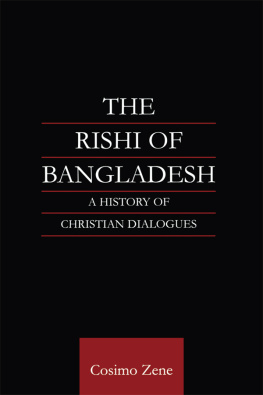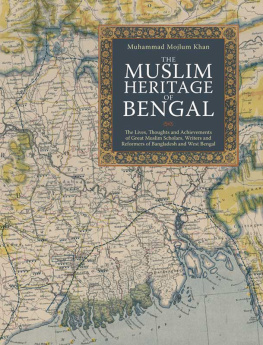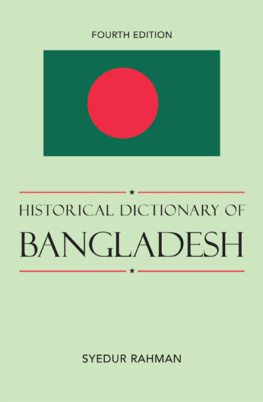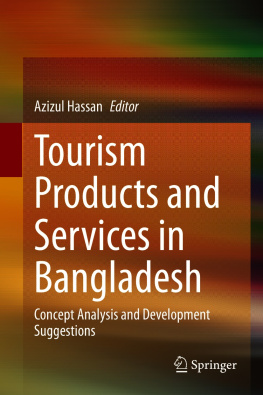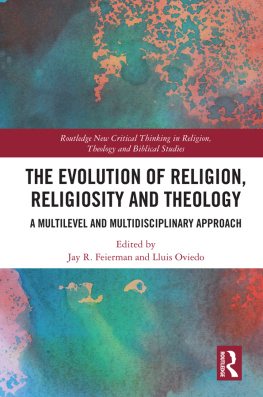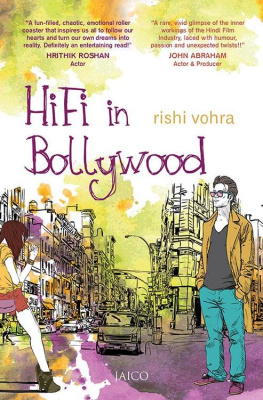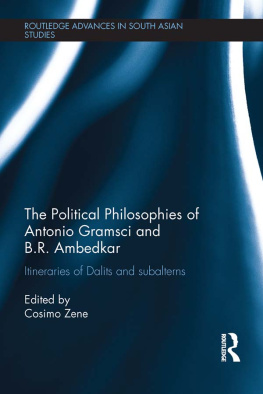THE RISHI
OF BANGLADESH
A History of Christian Dialogues
THE RISHI
OF BANGLADESH
A History of Christian Dialogues
Cosimo Zene
First Published in 2002
by Routledge
2 Park Square, Milton Park, Abingdon, Oxon OX14 4RN
Simultaneously published in the USA and Canada
by Routledge
711 Third Avenue, New York, NY 10017
Routledge is an imprint of the Taylor & Francis Group, an informa business
2002 Cosimo Zene
Typeset in Sabon by LaserScript Ltd, Mitcham, Surrey
All rights reserved. No part of this book may be reprinted or reproduced or utilised in any form or by any electronic, mechanical, or other means, now known or hereafter invented, including photocopying and recording, or in any information storage or retrieval system, without permission in writing from the publishers.
British Library Cataloguing in Publication Data
A catalogue record of this book is available from the British Library
Library of Congress Cataloging in Publication Data
A catalog record for this book has been requested
ISBN 0-7007-1521-5
This book is dedicated to the Rishi
and indeed to all those who struggle
to he recognised as manus.
Contents
PART ONE
The Rishi of South-West Bangladesh
PART TWO
The Rishi and Christianity (18561952)
PART THREE
The Xaverians and the Rishi (195294)
PART FOUR
Mission and Dialogue
A book such as this, inspired by dialogue, cannot come to fruition without taking into account the involvement of many people, who, in one way or another, have contributed to the dialogue. My thanks go primarily to all the Rishi, to whom this work is dedicated. They will never imagine how much I have learned from them, nor could they envisage my personal gain from witnessing their spirit of endurance in their endeavours to make life more bearable, despite all the odds being against them.
Many of their names appear in the text, but my appreciation extends also to those who remain unnamed. This gratitude is also extended to those missionaries, past and present, who have made an effort to step down from a pedestal and sit in conversation with the Rishi.
The research was carried out thanks to a scholarship granted by Missio (Aachen), a contribution from the Additional Research Fund (SOAS) and the Central Research Fund, University of London.
The process of rethinking the material gathered in the field has been facilitated by the intervention of many individuals: close friends and former confreres, lecturers and colleagues at SOAS in the Anthropology and other departments. I am particularly indebted to my supervisor and friend, Dr. Audrey Cantlie, who has been an inspiration throughout the research and writing of this work.
It is thanks to the encouragement and support of Simon Weightman, other colleagues, and the research students in the Study of Religions Department, SOAS, that I decided to transform my research into this book. In the final stages, the help of Jonathan Price, Chief Editor at Curzon, Michael Richardson, John Mackessy and Jenny Taylor, as copy editors, and Francesca Tarocco has been invaluable.
Among the institutions I visited while researching, I wish to mention the warm welcomes received at the Indian Social Institute, Delhi, the Centre for Social Studies, University of Dhaka, St. Xavier College and Library, Calcutta, and the archives of the PIME missionaries in Rome, who have also kindly granted permission to reprint various missionary maps.
Considering academic discourse as rooted in everyday life, I need to acknowledge the greatest debt to my parents who taught me to welcome others and learn from them. My fathers love for popular music and poetry, his sense of justice and his moments of meaningful silence are the basis for many reflections in this work, as too is the positive outlook on life that I learned from my mother. To both of them, grazie di cuore!
I cannot conclude without expressing my deepest thanks to my wife and companion, Gabriella, who has supported me in many ways, from reading the very first research drafts to the final stage. Her common sense has helped me to keep much of the theoretical reasoning to a minimum! Thanks also to her and to our enchanting son Stefan for being so understanding for the many hours that babbu has spent at the computer.
The Frog and the Snake
While researching this book, I learned of a story told by a Rishi to a missionary. When he was asked, What is Christianity for you?, his reply was: We are like a snake which holds in its mouth a juicy frog, too big to be swallowed, but too good to let go!
Like an Aesops fable, this metaphor captures many aspects of the Rishi relationship with Christianity. It is, perhaps, less innocent than it initially seems for the Rishis veracity in formulating it, given his eagerness to please the missionary, is not unequivocal. For myself, I take the story at face value, but as a hypothesis to be tested rather than a thesis to be announced, as a process in act rather than as a fait accompli. Whilst many happenings in the encounter of the Rishi and Christianity confirm the truthfulness of the fable, this might not reveal the whole story. If many events show how the Rishi have managed to negotiate with success their own space within Christianity, others disclose the power of Christianity and its agents in domesticating people. Perhaps the fight between the Snake and the Frog is not over yet, for the Rishi who created the fable knew that ultimately it is the snake which has the upper hand. Unaware of what might have happened elsewhere, the Rishi seems confident in the cunning ability of his own people to appropriate Christianity in order to reach its objectives. The metaphor catches but a transient moment of this interplay at other times called also a dialogue between the Rishi and the missionaries; in reality this is still in act, and hence both Rishi conversion and missionary adaptation can be seen more as a process than an accomplished achievement. What makes it all the more fascinating is the apparent inequality of power displayed in the fight: the sophisticated apparatus of Western Christianity, equipped with a clear strategy and backed by financial support on the one hand, and a group of Untouchable leather-workers, occupying the very lowest place in society on the other. As the story of this encounter evolves, it becomes apparent how both have needed each other: the missionaries could justify their presence in the region primarily because the Rishi responded to their appeal, and the Rishi found in the missionaries the potential to affirm their dignity as human beings.
The combination of historical and ethnographic data in the book is the result of the methodology adopted to recount the story as the authors themselves have tried to convey it. Of course, a great amount of written documents, as reported in belongs almost exclusively to missionary sources. However, for all that the Rishi are described there in missionary terms, they are not completely assimilated by missionary writings. The text, in fact, reporting the Rishis voices, particularly when opposing missionary power and paternalism, contains many traces of Rishi resistance and ability to negotiate. These voices are further recovered when equated with the oral tradition, collected among the Rishi through ethnographic fieldwork.

